|
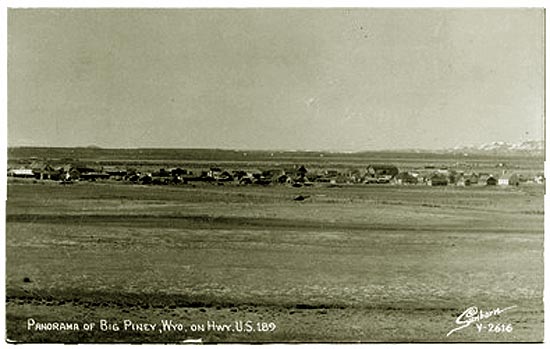
Big Piney, approx. 1940.
Some 35 miles southwest of Pinedale lie the twin towns of Big Piney and Marbleton.
Although the two towns are adjacent to one another, each have separate municipal governments.
Big Piney is regarded as the oldest community in Sublette County. Big Piney takes its name from the
Creek. At the time as can be seen in the photo, there were no trees on the town site.
The town was laid out in 1880 by Daniel Bockins Budd (1838-1902).
Prior to 1879, Budd was employed at the prison in Leavenworth, Kansas. In 1879, a brother who had an
interest in cattle in Nevada died. Budd with Hugh McKay and several cowboys rounded-up 777 head of his brothers cattle and trailed them to
Wyoming, intending to ship them eastward from Point of Rocks. On reaching, an area about five miles north of
present-day Big Piney, Budd and his party were delayed and found it necessary to winter over in the area.
The following year, Budd brought his wife and children back to the area and with McKay established a cattle business.
In 1890, Budd bought out McKay's interest. McDay then moved to Opal where he purchased a store.
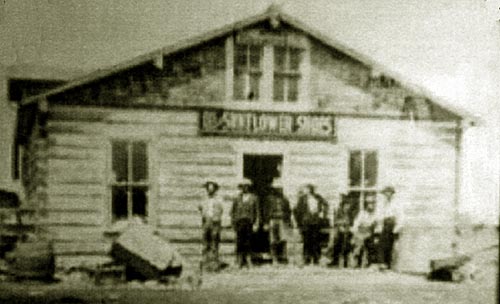
Budd Store and Post Office, Big Piney, undated.
On August 27, 1898, three armed men entered D. B. Budd's store and post office and relieved Budd of
aoubt $200, boots, blue flaqnnel shirts, camel's hair underwear, brown gauntlet gloves, pocket knives,
a Neanea bridle with chain and bit. One was described as about five foot nine inches in height and about
26 years years old. He had a light complexion, inclined to be florid, light hair and eyes and weighed about
160 pounds. He carried a nickel-plated revolver with a bone or pearl handle. lAnother robber was about
five foot six inches tall with dark complexion and a dark mustache. The remaining robber was about five foot
eight inches tall.
A posse tracked the robbers. They had concealed spare horses in an old tie camp. A week later the posse
led by Sheriff Ward engaged in a shoot out with the robbers. One of the deputes lost two fingers and was shot
through the wrist. The robbers made good their escape. The robbers have not been positively
identified, but suspicions have centered on Dave Putty, Harvey Logan ("Kid Curry") and Bud Nolan all of whom were suspected in the robbery of
Settling in the Big Piney area at the same time as Budd was Amos Wesley Smith (1846-1919)who established the Mule Shoe Ranch located closer to the Green River. In
1894, Smith purchased the 67 Ranch. The post office was first located at the Mule Shoe,
but later moved to the Budd Store. Mail was brought from
Opal once a week. Other major ranchmen in the area included Ed Swan and Heck Reel from Cheyenne.
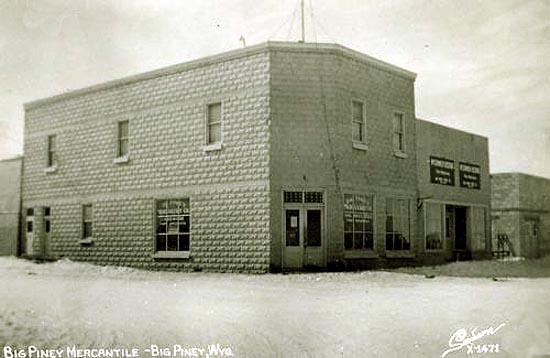
Big Piney Merchantile.
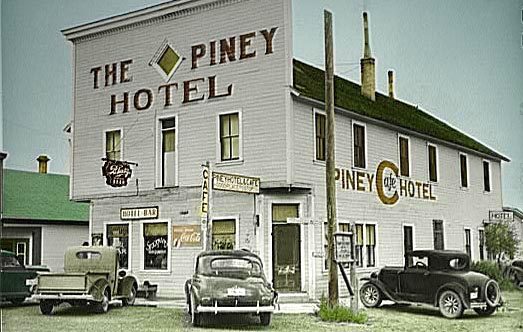
Piney Hotel.
The hotel was constructed by Franklin Daniel Chapel (1873-1942). Chapel moved to Big Piney about
1912 and purchased the "Bucket of Blood" saloon from Floyd Norris. He then
constructed the hotel. As can be seen from the next photo and from second floor door, the
hotel originally had a second floor porch which wrapped partially about the building.
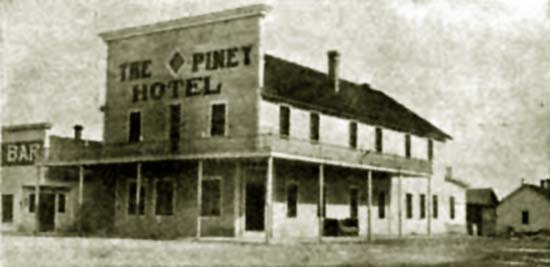
Hotel, Big Piney, 1918.
The building to the left of the hotel with the sign "Bar" was the "Bucket of Blood" commonly called the
"Bucket." The hotel was famous for its mountain trout.
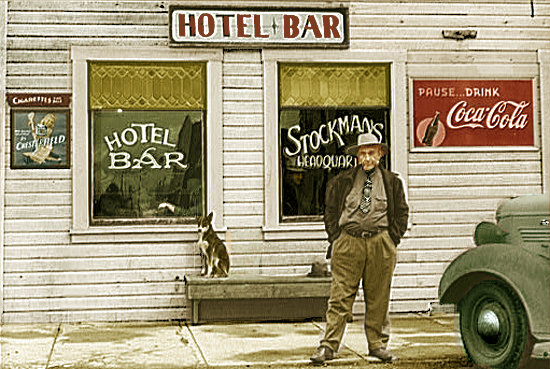
Piney Bar and Cafe.
The hotel, the Bucket, the city hall and jail all burned
in August 1948. Several occupants of rooms on the second floor of the hotel were rescued by stockman and
rodeo cowboy Ross H. Meeks (1912-1973).

Big Piney, 1917.
Winters in Big Piney can sometimes be a bit
nippy. Big Piney is sometimes referred to as the "Ice Box of the Nation," a name it acquired when a weather station was established in
1930. In 1953, a proposal to change the name of the town to "North Pole" was rejected. In December 1964, the town lost
power when the temperature was 20 degrees below zero. In December 1990 for the entire month, it never got that
warm.
Next Page: Big Piney continued, Marbleton
|